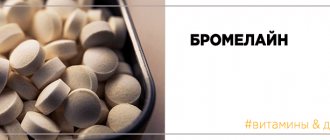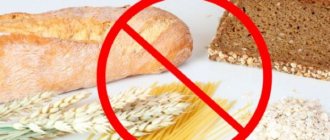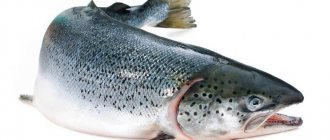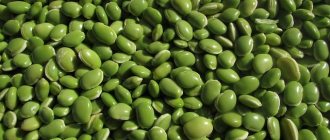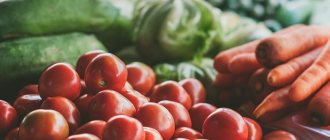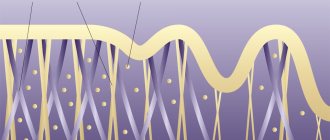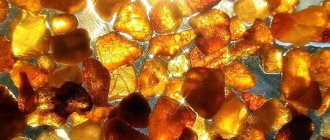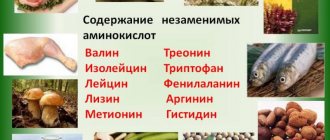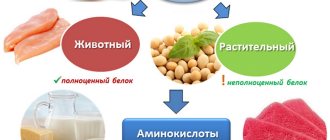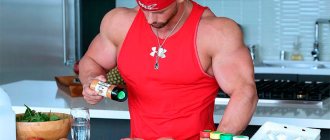Products containing protein
When it comes to protein, two of the most frequently asked questions are “how much protein does the body need?” and “which foods contain large amounts of protein?” Protein or protein is the main element of our body and it is especially important for people actively involved in any kind of sports.
Of all the nutrients, protein is the most essential for the healthy functioning of the body. More than protein, your body needs only water.
During active strength training, a sufficient amount of protein foods in the diet is the key to muscle growth.
At the stage of active growth, the body takes the material necessary to “build” lean muscle mass from protein. That is why at this stage it is so important that the diet contains high-quality food rich in protein in sufficient quantities.
The big question is how much protein does the body need for optimal growth?
Experts note that the recommended daily intake is 1 gram of protein per kilogram of body weight. This norm is designed for the average person, whose goal is neither weight gain nor weight loss - in other words, no active physical activity is present.
Recent studies have shown that for people who are actively involved in strength training and strive for impressive muscles, it is necessary to eat much more protein per day.
On average, experts suggest increasing the norm to 2 grams of protein per kilogram of weight (sometimes more, sometimes less). Of course, the optimal amount of nutrients for your body can be calculated through trial and error.
In order to determine the “starting point” you just need to multiply your own weight by 2. For example, you weigh 80 kilograms, you are actively training and want to gain muscle mass. Multiply this number by 2, so your daily protein intake is 160 grams.
The amount of protein you need is determined based on your physical activity. A person whose goal is only to slightly tone his muscles (by doing strength training from time to time) will need several times less protein than a professional bodybuilder competing in competitions.
However, the fact remains that in order to get large, well-defined muscles, it is important to eat enough high-protein foods in addition to working out.
Conventionally, protein-rich foods can be divided into 5 categories:
- Pure protein;
- Healthy protein;
- Vegetable protein;
- High protein foods;
- Dairy products.
What is a protein diet?
Protein is one of the main micronutrients.
Even the simplest protein diet has a positive effect and performs the following important functions:
- Regeneration and support. Protein is the main building material of our tissues. It is with the help of protein that tissues are constantly renewed and regenerated.
- Acceleration of chemical processes. Most enzymes responsible for chemical reactions in the body are ordinary protein molecules.
- Hormone production. Proteins stimulate the production of hormones. So, if there is a lack of growth hormone, doctors always recommend a protein diet.
- Delivery of important substances. Some proteins deliver the necessary substances to the cells of our body. In particular, oxygen enters our cells thanks to the hemoglobin protein.
Protein is made up of small parts known as amino acids. Of the 22 amino acids in protein, 9 are considered extremely important and should definitely be included in your diet.
Not all foods contain the necessary amino acids for our body. Animal proteins are considered the most complete, as they provide the necessary amino acids. A protein diet whose products include eggs, meat, fish, poultry and milk is considered the most balanced.
Proteins from vegetables, unfortunately, contain lower amounts of amino acids, so it is important to combine them with other plant proteins. Legumes and grains contain a large amount of proteins. Don't forget about seeds, nuts and soy.
A simple protein diet menu for every day should be based on the amount of protein eaten. Although the quality of the protein also plays an important role. Many scientists agree that the established protein intake may be too low to support a healthy lifestyle.
Conclusion: The amino acids contained in protein are not produced by our body. Including protein in your diet is a must.
Pure protein
These products are maximally rich in protein with minimal amounts of other nutrients. This food is the most effective option for people trying to build muscle mass.
These products are acceptable in the diet of professional bodybuilders, weightlifters and other athletes at any time. If the goal is not only to gain muscle mass, but also to actively burn fat, then most of the protein should come from foods whose calorie content is at least 70% protein.
If the goal is to gain muscle mass, then the products included in this list can be eaten in any quantity and at any time.
However, remember that protein is not the only thing needed to build muscle. An integrated approach with sufficient amounts of carbohydrates and fats is important. Muscle growth depends not only on the amount of protein eaten, but also on total calories.
| Product name | Recommended Serving Size | Calorie content | Amount of protein per serving (grams) |
| Whey Protein | 1 serving, according to manufacturer's directions | 100 | 24 |
| Egg white | 170 grams | 102 | 24 |
| Turkey breast | 85 grams | 90 | 20 |
| Tuna | 115 grams | 120 | 26 |
| Chopped turkey | 85 grams | 110 | 24 |
| Chicken breast | 85 grams | 90 | 18 |
Pros of a protein diet
In addition to the fact that protein helps reduce excess weight, it also has other positive effects on the body:
- Increased muscle mass. Combining a protein diet with strength training helps build muscle mass.
- Reduce age-related muscle loss. Over the years, most people lose muscle mass. Drinking protein shakes helps prevent muscle loss in healthy older men, as well as in those who are prone to losing muscle mass due to any disease.
- Strengthening bones. A protein-rich diet helps prevent osteoporosis, which is common in women. Studies have shown that a diet that includes animal protein helps reduce the risk of this disease by 69%.
- The ability to accelerate wound healing. Eating protein helps improve the healing process after surgery or injury, including bedsores.
Conclusion: Protein helps build and maintain muscle mass, protects bones from osteoporosis and promotes skin regeneration.
Intermittent fasting 16/8: rules, how to use, where to start
High Protein Foods
There are many other foods that contain protein. The following products contain enough not only protein, but also fat, which makes them an organic addition to any diet.
But be careful. Although high in protein, many of these foods are also high in fat, which is known to be healthy only in moderation.
| Product name | Recommended Serving Size | Calorie content | Amount of protein per serving (grams) |
| Beef steak | 60 grams | 115 | 17 |
| Steak | 60 grams | 123 | 16 |
| Chicken's leg | 60 grams | 110 | 14 |
| Chicken thigh | 60 grams | 110 | 12 |
| Lean ground beef | 60 grams | 145 | 15 |
| Pork | 30 grams | 105 | 8 |
Healthy protein
The following list of foods contains all the best foods for people looking to gain muscle mass.
In addition to protein, all these products contain healthy fats, such as omega-3 and omega-6 fatty acids, which, unfortunately, the body often lacks, especially if you adhere to a particular diet. Many weightlifters are wary of these foods, mistakenly believing that they are introducing unnecessary fats into their diet.
However, this is fundamentally wrong. For the health and proper functioning of the body, the presence of healthy fats in the diet is important. It’s better to try to eliminate fast carbohydrates such as sugar and wheat flour from your diet as much as possible.
What to do if you are on a diet? Add the following foods anyway. Omega-3 fatty acids help the body convert carbohydrates into glycogen, the fuel for building muscle.
| Product name | Recommended Serving Size | Calorie content | Amount of protein per serving (grams) |
| Salmon | 60 grams | 100 | 14 |
| Eggs | 1 PC. | 75 | 6 |
| Sardines | 60 grams | 120 | 11 |
| Peanut | 30 grams | 90 | 4 |
| Sunflower seeds | 30 grams | 140 | 6 |
| Almond | 30 grams | 170 | 6 |
Dairy
We've all heard that dairy products are high in fat and should be avoided if you're trying to lose weight.
Foods such as cheese, yogurt and milk are thought to contribute to weight gain rather than weight loss. In fact, the calcium contained in such products provides hormonal support to the body and promotes fat burning.
Weightlifters often include low-fat dairy products in their diet, especially when they are in the process of burning fat. However, be careful, there are a lot of high protein dairy products on store shelves.
If you're looking to bulk up, skim milk, cheeses, and yoghurts that are rich in protein and calcium are great options.
| Product name | Recommended Serving Size | Calorie content | Amount of protein per serving (grams) |
| Skim cheese | 170 grams | 120 | 22 |
| Milk | 230 grams | 150 | 8 |
| Low-fat cottage cheese | 115 grams | 100 | 16 |
| Low-fat yogurt | 230 grams | 120 | 13 |
| Cream | 230 grams | 90 | 9 |
| Low-fat cheese | 30 grams | 90 | 8 |
Protein diet menu for 7 days
The following menu is designed to consume about 100 grams of protein per day. If you wish, you can make changes to your diet yourself according to your needs.
1
Breakfast: 3 egg omelet, cereal bread with peanut butter, pear.
Lunch: green salad with soft cheese (1 avocado, 100 grams of cheese, any greens to taste), orange.
Dinner: 170 grams of steak, grilled zucchini, some potatoes.
2
Breakfast: Smoothie made with coconut milk, berries and one spoon of protein powder.
Lunch: baked or boiled salmon (115 grams), seasoned with any herbs and butter, apple.
Dinner: chicken or chicken (115 grams) with vegetables and lentils.
3
Breakfast: oatmeal, 100-150 grams of yogurt, some nuts.
Lunch: 115 grams of chicken with avocado and red pepper, peach.
Dinner: stew with brown rice.
4
Breakfast: tortilla of 3 eggs, cheese, olives, tomato and red pepper, orange.
Lunch: veal stew with brown rice.
Dinner: 115 grams of halibut with lentils and broccoli.
5
Breakfast: cottage cheese (150−200 grams) with an apple, cinnamon and a handful of nuts.
Lunch: 115 grams of salmon, baked with herbs and vegetables, croutons.
Dinner: chicken cutlets with pumpkin, berries.
6
Breakfast: frittata of 1 egg, 30 grams of cheese and one potato (cut into thin slices)
Lunch: chicken cutlets with pumpkin, apple.
Dinner: shrimp with beans (no more than 1 cup), onions, red pepper, guacomole sauce,
7
Breakfast: protein pancakes with pumpkin, a handful of nuts
Lunch: natural yogurt with fruit (pineapple) and grated almonds.
Dinner: 170 grams of salmon, vegetable stew.
A simple protein diet menu for a week should be varied.
Vegetable protein
Until recently, vegetables and grains were not even considered as a source of protein. However, many plant-based foods are excellent sources of quality protein—an excellent option for vegetarians looking to gain muscle mass.
Another advantage of these products is that they are rich not only in protein, but also in fiber, which promotes better functioning of the gastrointestinal tract.
| Product name | Recommended Serving Size | Calorie content | Amount of protein per serving (grams) |
| Tofu | 115 | 94 | 10 |
| Lentils | 115 | 115 | 9 |
| Soy milk | 230 | 130 | 10 |
| Peas | 170 | 85 | 6 |
| Red beans | 115 | 113 | 8 |
| Pinto beans | 115 | 117 | 7 |
If you want to gain muscle mass quickly, make sure your diet contains enough foods high in protein. Select one or more foods from the lists above and be sure to include them in your diet.
Source: https://www.building-muscle101.com/food-high-in-protein.html
